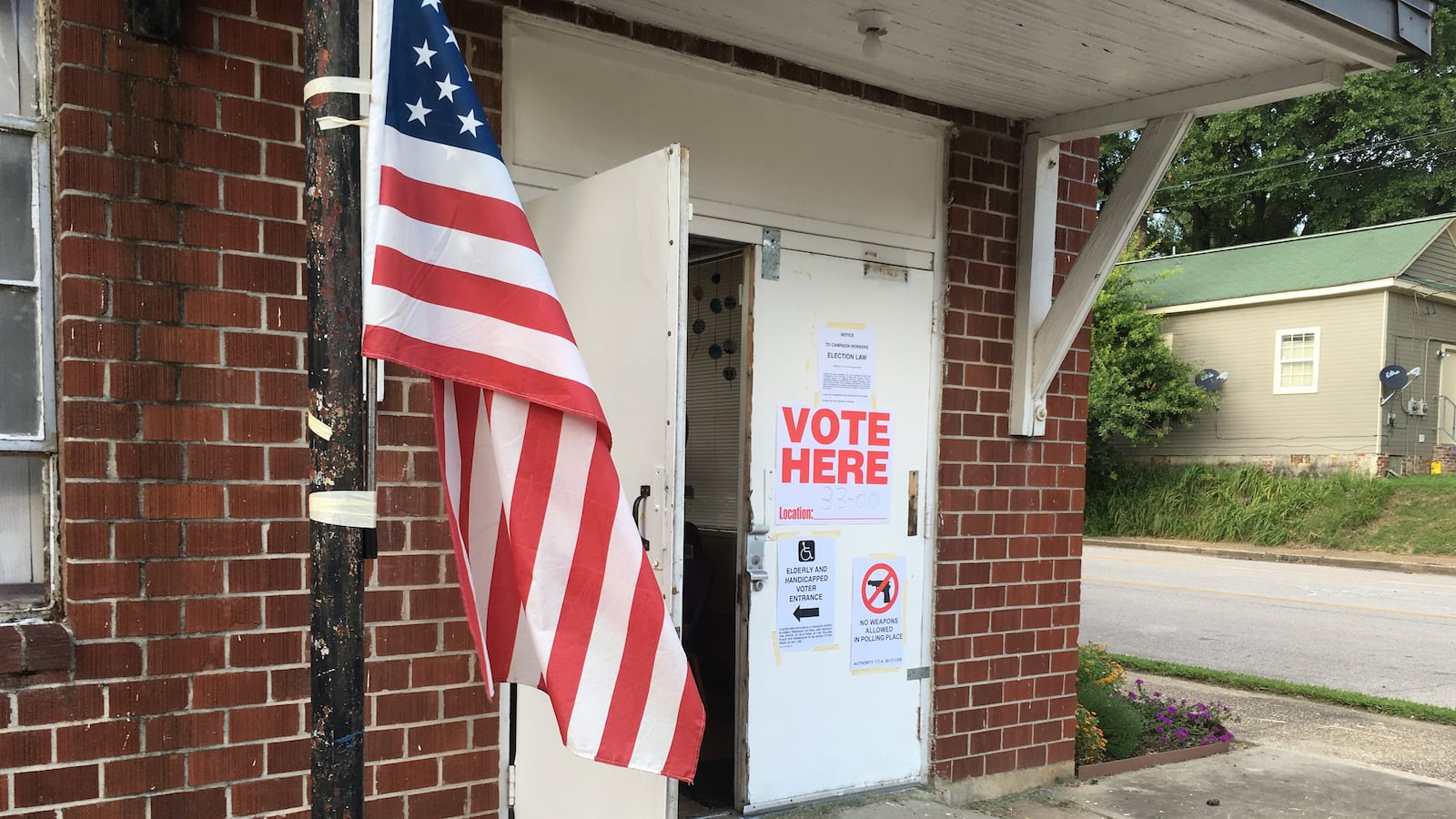Election Day 2016 is still six weeks away, but Indiana’s political season has already seen some extraordinary twists and turns — and more curves are likely in the road ahead.
For educators and people invested in the state’s schools, there’s a lot at stake as voters’ choices — at the state and local level — could make a huge difference in the directions the state and city take when it comes to efforts to improve schools.
On Tuesday, the candidates for governor — Democrat John Gregg and Republican Eric Holcomb — will debate education at Lawrence North High School.

State Superintendent Glenda Ritz is expected to do the same with her Republican opponent, Yorktown Superintendent Jennifer McCormick, early next month.
And next week, Chalkbeat will co-sponsor an event with the candidates for Indianapolis Public School Board on Oct. 5 along with WFYI, The Indianapolis Recorder and the Central Library. There are 10 candidates running for four seats.
To get ready for those events, here’s a list of the seven big surprises that have shaped the campaign season so far:
- Donald Trump won the Republican nomination.
Since Trump unexpectedly sewed up the Republican nomination last spring, there has been a lot of discussion about how his name at the top of the ticket will affect down-ballot races in Indiana, like governor and state superintendent.
Will Trump depress turnout from the many moderate Indiana Republicans, hurting the party’s other candidates on the ballot? Or will he turn out a similarly large, but perhaps different, group of Republican voters than we’ve seen before? And might this year’s Republican voters have different priorities on education?
Could Trump turn off the key Indiana constituency of suburban Republican women, as some polls have shown as a possibility, and might that affect the superintendent’s race, where suburban voters are a critical target for both Ritz and McCormick?
- Indiana Gov. Mike Pence gave up his re-election bid to run with Trump.
This is where Trump’s candidacy has had the biggest, and most unexpected, impact in Indiana. Until a couple weeks before Trump selected Pence as his vice presidential running mate, few observers expected Pence to get the nod.
Trump’s pick took Pence off the ballot in the governor’s race and defused what was expected to be a 2016 Indiana election in which education would be a big issue. The rivalry between Pence and Ritz sparked a four-year battle for control of the direction of education policy in Indiana. Gregg and Ritz were expected to both run against Pence’s four-year education policy push for tougher test-based accountability for teachers and schools and his strong support for school choice programs.
With Pence now replaced by Holcomb, education has not been as much of a front-line issue in the campaign. Holcomb hasn’t even announced his education agenda yet, though it is expected to be announced this week.
- The chances of Indiana electing a Democratic governor have improved.
At the start of 2016, Gregg had reason to believe he had a decent shot at unseating Pence. He had lost to Pence in 2012 by just 3 percentage points in a state that leans strongly Republican and Pence had angered some of his early supporters during his first term with his priorities on issues ranging from education to gay rights.
But even the most optimistic Gregg supporter probably would have acknowledged that beating an incumbent Republican governor he had already lost to once in a state like Indiana always was going to be tough. With Pence out of the race, Gregg is hardly a shoo-in. The race has been tightening, but Gregg has led Holcomb in the polls since Pence joined on with Trump. Holcomb has had to scramble to raise money, build a campaign team and craft his policy positions.
Holcomb has a tough challenge after a career as a Republican party operative who has never run for office. He’s had to educate voters about who he is, persuade them that he stands for positions they believe in and convince them they can trust him to support those positions despite not having a track record as an elected official.
Gregg, a former Indiana House speaker, is much better known to Indiana voters. Were he to win, it would instantly reset the balance of power on education policy. As Indiana has seen under Pence, the governor plays a big role in crafting the state’s choices on education by nominating the members of the Indiana State Board of Education and by setting the legislative agenda each year.
A Democrat in the governor’s chair would be a big change. Especially given the next surprise on this list.
- A big money advantage appears to have Ritz a in a strong position to be re-elected.
When McCormick announced she was running against Ritz in January, she was an intriguing candidate, and there was reason to believe she could be a formidable foe.
She was a respected superintendent who had served as an education leader much of her career. She was an ally of former state Superintendent Tony Bennett and has support from many of his key financial and political backers, but she was not strongly identified with the accountability and school choice program Bennett pushed that turned off some voters.
The question was whether McCormick could articulate a compelling reason why Ritz should be replaced, and give voters reasons to believe that she was a better choice.
There have been no public polls in this race, but the other signals have not been good for McCormick, especially fundraising. She badly trails Ritz, who depends heavily on unions for support. McCormick has captured very little of the financial support that propelled Bennett. In 2012, Ritz was massively outspent by Bennett thanks to his huge fundraising war chest.
McCormick also has been slow to fully explain her views on the issues, just unveiling her formal policy positions last week.
There was some question about whether Pence’s departure from Indiana could actually hurt Ritz by depriving her of a foe to rally support against, as she did with Bennett. But she could also be helped if Gregg runs strongly or by another Democratic Party wild card that ranks No. 5 on this list.
- Evan Bayh’s late entry into the Senate race could boost Democrats.
To try to recapture the U.S. Senate, Democrats persuaded a popular Hoosier with a golden name back into politics: former governor and U.S. senator Evan Bayh, whose father was also an Indiana senator.
Bayh’s return, six years after he stepped down from his senate seat while expressing disgust with the gridlocked state of the institution and of politics, buoyed Democratic hopes across the board. The big question was whether he could regain his popularity and propel support for other Democrats on the Indiana ballot, like Gregg and Ritz.
If anything, the answer to that question is less clear today than when Bayh jumped into the race this summer. Early polls showed Bayh with a huge 20-point lead on Republican Todd Young, but Republicans donors are spending millions to keep Indiana’s senate seat red. The advertising blitz has helped drive that lead down to single digits.
- Almost no matter what happens, a new landscape in education politics is likely to emerge for Indiana.
This much is certain: The Pence vs. Ritz war is over. One of the few things Holcomb has said about his education plans is that he would respect the state superintendent’s role and work with her.
McCormick has also expressed distaste for the the political wars over education. Gregg has made his track record of compromise with Republicans as House speaker a centerpiece of his campaign.
So the stage is set for better cooperation between the parties.
If Ritz and Gregg both win, however, the Democrats would be in a much stronger position to push back on the reforms the Republican-led legislature has advanced over the past six years, and perhaps even lay out a new Democratic vision for how education should be managed in the state.
- The opposition to the IPS school board majority is organized this time.
Three groups are working together to try to counterbalance the influence of groups that advocate for education reform, like Stand For Children and the Institute for Quality Education, in the IPS race.
The Concerned Clergy of Indianapolis and the local chapter of the NAACP have been joined by a new coalition of activists that calls itself OurIPS to push an alternative slate of candidates that has professed distrust of Superintendent Lewis Ferebee and skepticism of the school board’s school improvement plans, such a expanding school autonomy and partnering with charter schools.
Those groups together have endorsed, and promised to campaign for, challengers who are seeking all four seats that are on the ballot, directly opposing three incumbent school board members.
The education reform groups have been on a winning streak. All of the seven current members of the IPS board were backed in the past by individuals or organizations that also support the direction the board has charted since 2012.
So this election will be a critical test to determine if IPS continues with the plan, changes direction or comes away with a divided school board that might have to negotiate more compromises while shaping district policy.

